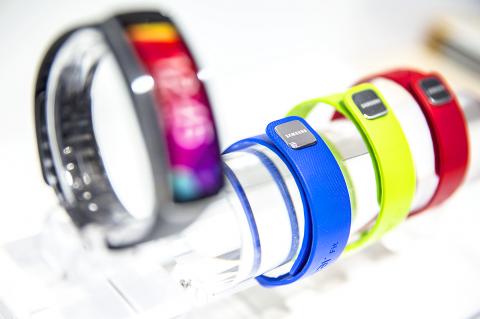Intel Corp plans to use wearable gadgets such as smartwatches to monitor patients with Parkinson’s disease and collect data that can be shared with researchers.
On Wednesday, the chipmaker said it is teaming up with the Michael J. Fox Foundation, established by the actor and Parkinson’s sufferer in 2000, to conduct a multi-phase research study of the neurodegenerative brain disease. An estimated 5 million people globally have been diagnosed with Parkinson’s, the second-most common neurodegenerative disease after Alzheimer’s.
The initial goal is to determine the feasibility of using wearable devices to monitor patients remotely and store that data in an open system that can be accessed by scientists.

Photo: Bloomberg
In the next phase of the study, which is likely begin in the fall, the foundation is to set aside funds to explore how patients are responding to medication. Participants are to be monitored via an array of wearable devices.
“As more of these devices hit the market, we can collect objective measurements and determine the efficacy of new therapeutics,” senior vice president for research partnerships at the foundation Sohini Chowdhury told reporters.
Clinical trials have been far too “subjective” in the past, she said. For example, a patient might inform her doctor that she felt a tremor for several minutes, when it actually lasted a matter of seconds. In the future, Chowdhury hopes patients and their doctors could have more precise measurements via wearable devices about the “frequency and severity” of symptoms.
Chowdhury said the foundation would continue to raise funding to cover the costs of providing wearable devices to patients.
By using such devices, the foundation and other research groups can tap into a broader pool of patients for clinical trials, Chowdhury said. Today, many people with Parkinson’s disease are unable to participate in clinical trials because they do not live near a research facility.
However, wearable devices offer a convenient way to track patients from their work or homes, allowing people in rural parts of the US to participate.
As it expands beyond the PC arena, Intel hopes to capture a share of the growing market for big data analytics and wearable devices in the health sector.
Intel’s Big Data Solutions group general manager Ron Kasabian said the data center and “Internet of Things” business units are exploring the sector.
“We are exploring how to pull data out of devices in real-time,” he said. “We can mine data to improve research, and better understand the behaviors and progression of the disease.”
While Intel boasts its own wearable technologies, Kasabian stressed that the Parkinson’s study is device agnostic, meaning patients can test a variety of wearable gadgets. In March, Intel completed its acquisition of Basis Science, a startup that is best known for its wrist band that measures the wearer’s heart rate.
Intel expects to extend similar programs to related areas of healthcare, as well as other industries, including manufacturing.

Real estate agent and property developer JSL Construction & Development Co (愛山林) led the average compensation rankings among companies listed on the Taiwan Stock Exchange (TWSE) last year, while contract chipmaker Taiwan Semiconductor Manufacturing Co (TSMC, 台積電) finished 14th. JSL Construction paid its employees total average compensation of NT$4.78 million (US$159,701), down 13.5 percent from a year earlier, but still ahead of the most profitable listed tech giants, including TSMC, TWSE data showed. Last year, the average compensation (which includes salary, overtime, bonuses and allowances) paid by TSMC rose 21.6 percent to reach about NT$3.33 million, lifting its ranking by 10 notches

Popular vape brands such as Geek Bar might get more expensive in the US — if you can find them at all. Shipments of vapes from China to the US ground to a near halt last month from a year ago, official data showed, hit by US President Donald Trump’s tariffs and a crackdown on unauthorized e-cigarettes in the world’s biggest market for smoking alternatives. That includes Geek Bar, a brand of flavored vapes that is not authorized to sell in the US, but which had been widely available due to porous import controls. One retailer, who asked not to be named, because

SEASONAL WEAKNESS: The combined revenue of the top 10 foundries fell 5.4%, but rush orders and China’s subsidies partially offset slowing demand Taiwan Semiconductor Manufacturing Co (TSMC, 台積電) further solidified its dominance in the global wafer foundry business in the first quarter of this year, remaining far ahead of its closest rival, Samsung Electronics Co, TrendForce Corp (集邦科技) said yesterday. TSMC posted US$25.52 billion in sales in the January-to-March period, down 5 percent from the previous quarter, but its market share rose from 67.1 percent the previous quarter to 67.6 percent, TrendForce said in a report. While smartphone-related wafer shipments declined in the first quarter due to seasonal factors, solid demand for artificial intelligence (AI) and high-performance computing (HPC) devices and urgent TV-related orders

MINERAL DIPLOMACY: The Chinese commerce ministry said it approved applications for the export of rare earths in a move that could help ease US-China trade tensions Chinese Vice Premier He Lifeng (何立峰) is today to meet a US delegation for talks in the UK, Beijing announced on Saturday amid a fragile truce in the trade dispute between the two powers. He is to visit the UK from yesterday to Friday at the invitation of the British government, the Chinese Ministry of Foreign Affairs said in a statement. He and US representatives are to cochair the first meeting of the US-China economic and trade consultation mechanism, it said. US President Donald Trump on Friday announced that a new round of trade talks with China would start in London beginning today,